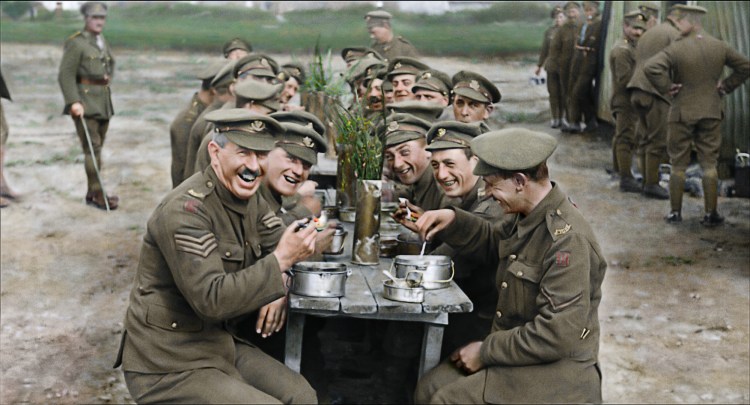After viewing the historic charge of the Light Brigade during the battle of Balaclava on Oct. 25, 1854, in the Crimean War, French Army Gen. Pierre Bosquet famously commented, “It is magnificent, but it is not war: it is madness.”
In Academy Award winner Director Peter Jackson’s (“Lord of the Rings) documentary film “They Shall Not Grow Old,” opening at the Railroad Square Cinema this week, that statement rang in my brain even louder than the first time I heard it.
Here’s your menu: Before the film begins, Jackson will tell you all about how it was done, about the hours and days, weeks and months it took to put this stunning piece on the screen. You will learn about the process of restoration and all the incredible effects you will see. You will be amazed but a little bored. That will soon change.
This month you will have read a lot about this piece, and have watched television stories about the process of turning the black-and-white news footage of that terrible time into full color.
Yes, they have restored the brown grass of Belgium to its true green and brought the red of the blood smeared across the mud, in fact, pools of blood, lakes of blood, to its original color.
You’ll see the white of the blue and brown eyes blown loose and scattered across the chests of the blind and the dead. How that was done will be explained to you. That is not my job.
My job is simpler and requires no technical education. My job is the same as that of Gen. Bosquet, to give you my opinion of what I saw.
In fact, you will see more madness than glory, more cruelty, death and horror than bravura.
“They Shall Not Grow Old” is magnificent, but it is not entertainment. It is war, the first world war, properly called “The Great War.”
Many countries fought on these bloody fields, and America had more than her share of the horror, some of it on this very site.
But Jackson’s film deals solely with the British share of this tragedy, in which more than one million British soldiers died in the mud; had their corpses eaten by rats, stepped on by their advancing friends and retreating Germans; and were then buried by the avalanches of mud. In all, more than 10 million military personnel died in that war.
You will see all of that, not in soothing black and white of the sentimental and heroic British and American movies made after.
Here, you will get to walk into the actual war and see the horror.
John Wayne and Robert Taylor are not in the cast. Instead they’re “Birdie” or “ Ginger,” a Tommy and Ben, fighting and dying here.
The film opens in black and white and on a small screen in the center of your usual wide screen. This is where you will learn about newspaper stories declaring war and how they roused a generation of bored shoe store clerks and unemployed truckers.
Most were young men, school boys really, some of whom died at 15 and 16.
There were middle-aged and older men who were startled into heroic fever by the headlines, aroused to patriotism by the cheering of their wives and girlfriends, men draped in scratchy wool, trained and shaped into a khaki fist and hurled onto the killing fields.
Jackson, in his pursuit to put truth on the screen, pulls no punches, makes no cuts away from the headless bodies, the staring blank eyes, the scattered feet of once-upon-a-time young dancers.
There is a social comment here not made, only viewed, when we see the big, smiling mouths of men that reveal a sea of rotting teeth or none at all.
These, to be sure, were the mouths of the lower-working classes and unemployed, who were the first to be swept up and shoved into flag-draped trucks.
The smiles of ranking soldiers and well-dressed officers, graduates of Eton and Cambridge, are quite different. That was England in 1914, as the classes mingled and died.
Jackson and his amazing crew will show you the bodies of young men, who only months prior were playing rugby on the fields of Britain, now lifeless, wet-wooled and still full of lice, mouths full of maggots, draped across fences of barbed wire, soaked by rain and their own blood, emptied of joy, stripped of flesh and dreams. Jackson has come to tell you the truth. Prepare yourself for it.
Then it’s over. Just like that. It’s over like a football game, like a dance when the music stops. The film ends on the 11th hour on the 11th day of the 11th month of 1918.
There is silence, an incredible heartbreaking silence.
The voice of one of the survivors is heard saying, “It was the flattest moment of my life.”
So, it was over, and the boys went home to the damp, foggy streets of England, got married and raised children, totally unaware that only 21 years would pass before they would wave their boys off to the very same killing fields where they once had fought.
“They Shall Not Grow Old” is magnificent, but it is not entertainment. It is war, “The Great War.” And the beat goes on.
J.P. Devine, of Waterville, is a former stage and film actor.
Send questions/comments to the editors.



